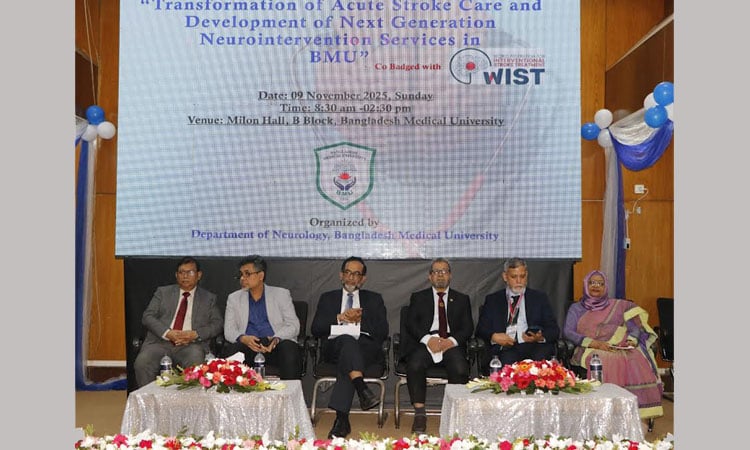News Flash

DHAKA, Nov 09, 2025 (BSS) – Experts at a conference today mentioned that nearly 80 percent of strokes are preventable through lifestyle changes.
They explained that it is essential to implement community-level interventions focusing on controlling high blood pressure, avoiding smoking, eliminating unhealthy eating habits, and combating physical inactivity.
Furthermore, stroke prevention education must be integrated from schools to workplaces, and even into urban planning, they opined.
They made the observation at the ‘International Stroke Conference 2025’ held at the Bangladesh Medical University (BMU) in the city, said a press release.
The international conference was organized by the Neurology Department of BMU in the Shaheed Dr. Milan Hall. The key slogan for this year's conference was 'United for Stroke'.
The event featured a scientific session titled, 'Transformation of Acute Stroke Care and Development of Next Generation Neurointervention services in BMU'.
In his address as chief guest, Vice-Chancellor of BMU Professor Dr. Md. Shahinul Alam laid emphasis on increasing public awareness about stroke, ensuring prevention, facilitating information exchange, expanding international training, and establishing modern stroke treatment services.
He observed that stroke remains the leading cause of death and disability in Bangladesh, yet the majority of cases are preventable.
He stated that the International Stroke Conference will open up new horizons in the management of stroke treatment.
He affirmed that BMU is committed to ensuring the most advanced stroke treatment, utilizing the assistance of foreign experts.
He added that the presence of international experts at the conference would significantly contribute to the advancement of stroke treatment in the country.
Other speakers emphasized the importance of stroke management, prevention, and adopting a multidisciplinary and collaborative approach to care.
A major concern highlighted by experts was the dangerously low level of public awareness regarding stroke, despite advancements in medical science. Millions of people in Bangladesh are currently unable to identify the primary symptoms of stroke, which causes significant delays in seeking help, leading many patients to lose their chance of survival.
Experts warned that in stroke cases, every minute is valuable. If the disease is initially detected, both life and brain can be saved. They further explained that a patient's life and brain can be protected if modern treatment methods are initiated in a timely manner.
The immediate need is the establishment of specialized stroke care centers in every region of the country that are capable of rapidly treating patients according to local demand.
Speakers strongly advocated for the need to harmonize global guidelines, facilitate information exchange, and expand international training.
They pointed out that sustainable development in stroke prevention and treatment is impossible without global cooperation.